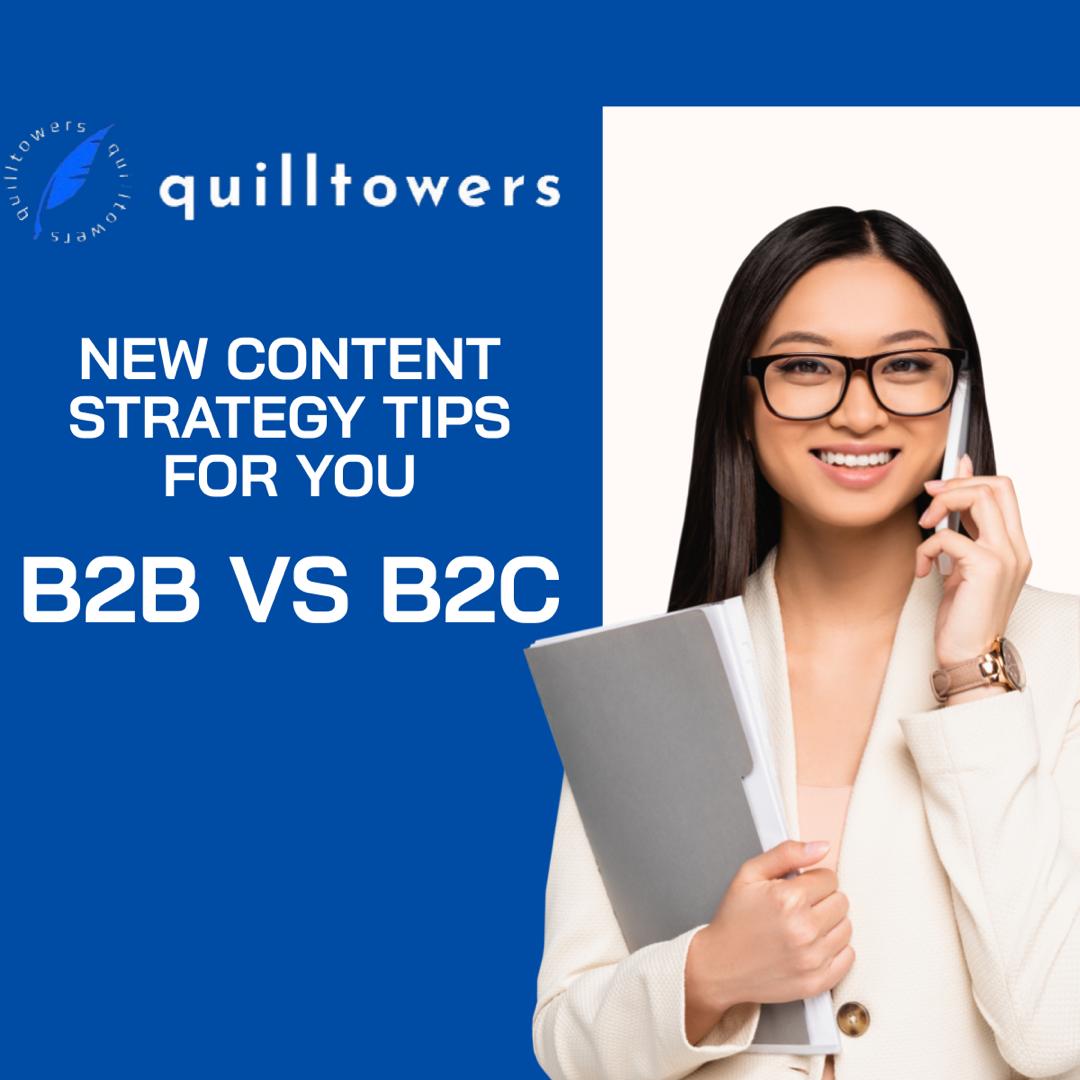New Content Strategy Tips For You: B2B Vs B2C
In our previous post, Quilltowers defined content strategy while sharing some important tips. We especially talked about storytelling and how important it is to creating content strategies. Today, we will continue sharing content strategy tips with you by comparing B2B with B2C content strategy approaches.
As we previously mentioned, content strategy is the entire guidance of planning, developing, creating, distributing and managing your contents. The question to be answered is to whom are these contents targeted? B2B and B2C answer this question.
B2B Content Strategy
B2B means Business to Business content strategy. It is the focus of a business in creating a relationship with another business. For instance, if your business makes doughnuts and cakes, your B2B content strategy aims to target event companies who can purchase your products for their clients’ birthdays or weddings. A business to business content strategy is therefore directed towards the MAN (Means, Authority and Need) of businesses you will love to gain as possible clients.

A B2B content strategy is meant to plan how your content can reach the people who make the decisions in a company. This can involve the use of blog posts, articles, infographics or videos that can be shared on social media. Some businesses prefer using the traditional media method such as television stations, the radio, famous newspapers or niché magazines. The contents shared can include white papers, webinars, seminars or case studies.
Tips to Create Extraordinary B2B Content Strategies
- Language Use: B2B contents depend heavily on your target client’s business. For example, as a cake baker who wants to sell to event companies, you need to understand the type of cakes you want to make and the expected clients of the event companies.
- Brand Identity: B2B contents need to reflect your brand identity and how they suit your target clients. Therefore, you need to conduct a content audit to analyse the gaps in your content strategy, brainstorm ideas for your content and fill these gaps with fitting contents. You also need to create goals for your content strategy and always track them to see if their performance metrics support your brand identity. Do not forget to experiment occasionally as well since exceptional contents are sometimes made in the heat of the moment.
- Authority Positioning: In B2B content creation, clients want to believe that they are buying from the best in the field. Take the real estate market as an example this time. A fix and flip real estate agent needs to create a content strategy that shows them as an authority in their field and why they are reliable. Real estate wholesale companies buy into this reputation and are more likely to buy from an agent who is widely known as a reliable authority in the field.
- Value: Above all, businesses need profits. Your B2B contents are more likely to attract other businesses when they include the ROI or profit margins that your clients are likely to make when they partner with you. Extraordinary contents in this regard do not make it obvious. Subtle references is all your clients need. However, make your market research and stick to the facts. Remember, you want to be reliable.
B2C Content Strategy
Business to Consumers refers to a type of content strategy that targets consumers. The focus of the business in this instance is to create a relationship with the consumers rather than other businesses. As a cake bakery, your contents are directed towards the family who want to buy the birthday cake or the bride who wants her birthday cake, and so on.

A B2C content strategy is usually done through social media with the sharing of graphics, videos, memes, and other contents that are meant to influence the consumers’ emotions.
Tips To Create Unique B2C Content Strategies
- Language Use: B2C contents are less formal and they tend to get more informal. Since they are targeted at the consumers, the business can afford to create a genuine relationship through the contents. The cake bakery for instance needs to focus on the joy of celebration, the importance of surprises and the need to nurture relationships.
- Brand Identity: Your contents need to focus on you as a person, your personality, the values of the company and the benefits that your products can provide for your consumers. Back to the real estate example, a fix and flip real estate agent in their B2C contents may make their brand identity about creating the perfect family home for their consumers’ family. Storytelling works magic in this instance.
- Influencer Marketing: B2C contents are not about facts, numbers or logic. They are about emotions. Social Media Influencers (SMIs) or industry specific influencers know their way around selling your products to their followers. Consumers tend to buy products that have been vetted by their favourite influencers.
B2C versus B2C Content Strategies
Although the two have several similarities, B2C content strategies create contents that are targeted towards individual consumers while B2B target business decision makers and professionals in that field. This means B2B requires facts, numbers, profit making and a strong brand identity while B2C focuses on emotions. B2B contents are geared towards products that have a more complex buying cycle. It takes time for all the decision makers to go through the bureaucracy of buying from another business, therefore the contents need to convince them that their time and the process is worth the purchase. B2C products are more used for instant purchases. B2B eventually measures its success through metrics such as lead generation and conversion rates while B2C is measured through engagement rates, brand awareness and the sales made from the content campaign.
Whether your need is the B2B or the B2C, we provide both services for our clients. Do not hesitate to contact us if you need further clarification or our services. For you, we are always here.






